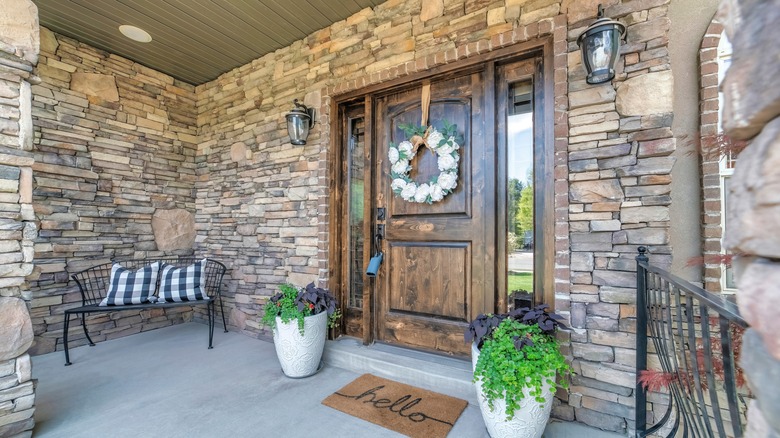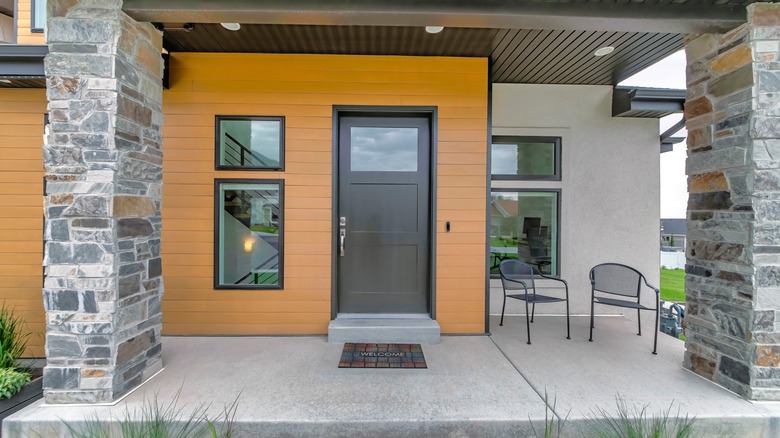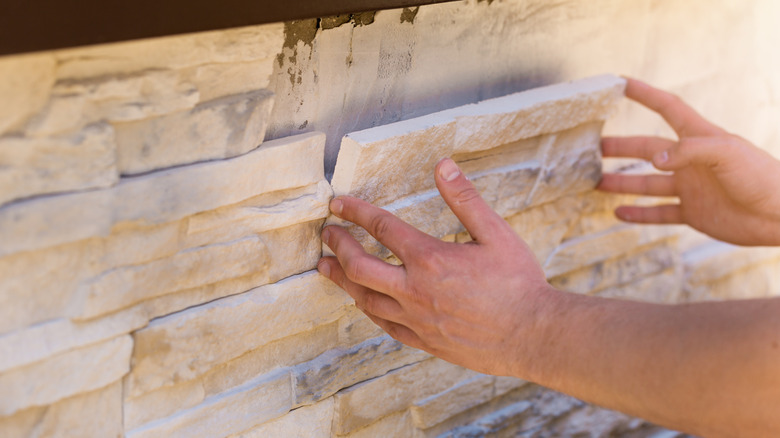Instantly Add Value To Your Home With One Unique Stone Exterior
While there are several types of house siding to consider, stone siding remains a popular choice for exterior home designs, given its durability and high return on investment (ROI). But the costs, effort, and time involved in shipping and installing natural stone siding have given way to a less expensive and more wieldy option: manufactured stone veneer (MSV).
These artificial stones are constructed from Portland cement and aggregates and contain iron oxide pigments to emulate the color and texture of natural stone. Cast out of actual stone molds, they achieve a nearly identical look but are lighter, thinner, available in more customizable sizes and shades, and most importantly, more budget-friendly. While they're an improvement over raw stone siding in many ways, though, their thinness and light weight typically prevent them from bearing loads, and they may not last as long as their natural counterparts.
For the most part, however, the pros outweigh the cons: Offering a natural look for your home, requiring little maintenance, and providing protection against the elements, faux stone veneer siding gives you the perfect opportunity to curate a unique stone exterior and increase your home's value without burning a hole in your pocket. So, is this option right for you?
Cost of stone veneer and effect on curb appeal
A striking home exterior determines the first impression you leave on your guests and potential home buyers. Since they closely mimic natural stones, stone veneers' ruggedness and rustic charm can be an instant hit with both modern and traditional decor lovers.
Even a little accenting with veneer stone can go a long way, enhancing the overall attractiveness of your home and adding to its curb appeal — a subjective surface-level evaluation that can translate to real-world dollars and cents. In fact, the 2023 Cost vs. Value Report from Remodeling by the Journal of Light Construction states that a 300-square-foot sheet of stone veneer siding costs, on average in the U.S., nearly $10,925 to install — meaning that these sidings provide an ROI of 102.3% since the resale price of your home rises by an average of $11,177 after installation.
Though manufactured stone veneers are less expensive than natural ones, the actual cost of upgrading your home's exterior depends on multiple factors, including labor costs and contractor commission, the price of building permits, the necessity of removing previous siding, and any expenses for additional materials or supplies required. This begs the question: Can you install stone veneer yourself (to save on labor costs) or should you involve a professional?
Stone veneer installation: professional versus DIY
Before installing stone veneer siding, you must ascertain that you've got the required building renovation permits and aren't violating any local regulations. Once you've successfully navigated renovation permits, it's time to contact a professional — or start calculating the amount of materials you'll need, if you're indeed embarking on a DIY adventure.
If you're someone who undertakes DIY projects regularly and is familiar with common siding installation concepts like sandblasting, weather-resistant barriers, and metal lath, you may be in the clear. But if you're a novice, contacting a professional would probably be better. If you do it yourself, according to RCP Block & Brick, you'll have to contend with complex calculations for surface coverage, appropriately guard the surface against water damage, mix and apply the scratch coat, and prepare your veneer for application. And the latter is easier said than done: Preparing the veneer includes measuring and designing the layout, trimming the veneer, and cleaning the exterior, before mixing the mortar and installing the pieces one by one. You'll also have to fill any gaps between the stones yourself for water resistance.
A professional will minimize the risk of damaging your house, remove existing trim and siding without creating a mess, and install the siding per manufacturers' guidelines to help you avoid expensive water leakage or ventilation issues down the line. While a DIY project might give you more satisfaction, you don't want to cancel out your savings by doing a less-than-ideal job; professionally-installed faux stone siding will give you a flawless exterior and a clean recoup of your costs.


